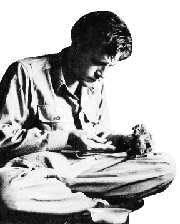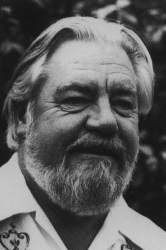 |
Much to his family's amusement and chagrin, Gerald Durrell was a collector from the beginning. As a young child living on the island of Corfu with his mother, brother, and sister, Durrell collected all sorts of animals. He kept so many that a whole room of the house had to be set aside for his zoo. Durrell taught himself what and how much to feed wild creatures as well as how to touch and pick them up, and how to nurse them when they were sick. However, as much as he learned he longed to know more.
After he left school, Durrell became a student keeper for the Whipsnade Zoo in England, and soon was given the job of traveling the world in search of specimens. His many books about this period in his life are filled with amazing and hilarious anecdotes. The work, he says, was extremely difficult but "could never, under any circumstances, be described as dull." However, Durrell did become bored with having to part with the animals once he had returned home. So Durrell decided that someday, somehow, he would have his own zoo.
Durrell had a second, more important reason for wanting to found a private zoo. In the course of many collecting trips to Africa and South America, Durrell had witnessed the loss of habitat and human depredation that was putting many animal species in danger of extinction. A private zoo would allow him to collect individual members of those animal populations and breed them in captivity.
 |
When Durrell acquired Les Augres Manor on the Island of Jersey, he was finally able to realize his dream. The sole purpose of this sanctuary, which he called the Jersey Wildlife Preservation Trust, would be to collect specimens of endangered species for breeding. This would ensure that if a species were unfortunate enough to become extinct in the wild, there would be zoo-bred animals of the same species to replace them. In a personal epilogue to his book The Whispering Land Durrell explains his mission:
"All over the world the wildlife that I write about is in grave danger. It is being exterminated by what we call the progress of civilization. A great number of creatures will become extinct if something is not done, and done swiftly... Some time ago I created on the Island of Jersey a zoological park which is now the headquarters of the Jersey Wildlife Preservation Trust. Our aim is to create a sanctuary in which we can establish breeding colonies of these threatened species, so that, even if they become extinct in the wild state, they will not vanish forever."
Durrell has spoken very eloquently about the role of the Jersey Preservation Trust and the role that he believes zoos should play in wildlife conservation. In this interview, he says that in conventional zoos, cages are designed with the convenience of the viewing public in mind. At the Jersey Wildlife Preservation Trust, cage designers consider the animals' comfort first, then the convenience of the animals' caretakers, and last of all the visitors. The Trust was the first zoo formed solely as a conservation facility specializing in captive breeding programs. It focuses on more obscure animal species, such as a particular type of Caribbean rodent, which the average zoo doesn't consider collecting because, Durrell has pointed out, these animals lack the "show value" of rhinocerous or tiger.
Following Durrell's death in 1995, the Jersey Wildlife Preservation Trust became the Durrell Wildlife Preservation Trust. It is still operating and still open to the public.
Page created on 9/21/2004 11:17:14 AM
Last edited 1/5/2017 9:25:17 PM
